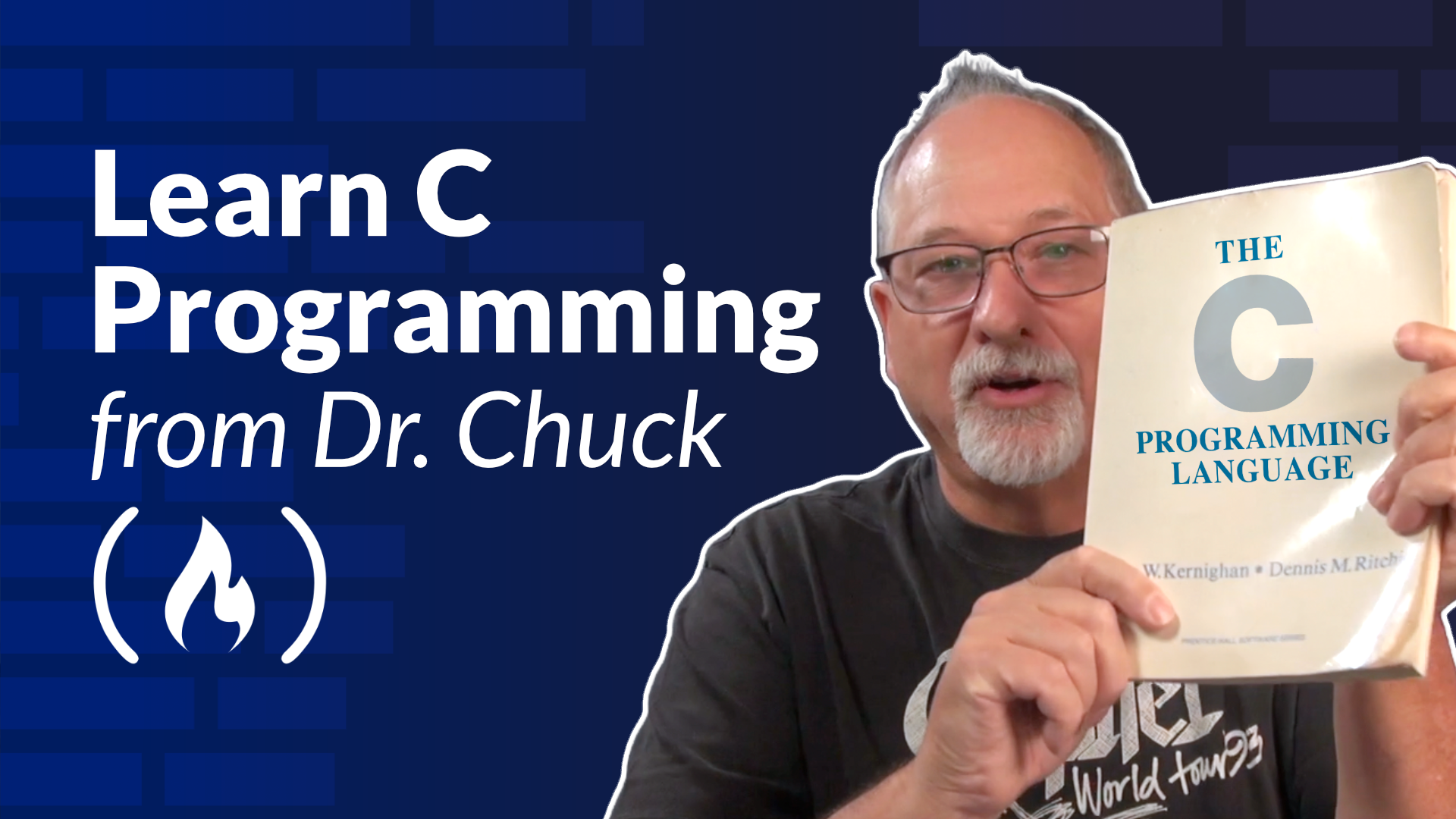We just released a comprehensive C course on the freeCodeCamp.org YouTube channel. This course, developed by Dr. Charles Severance (aka Dr. Chuck), is designed to help you understand computer architecture and low-level programming using the classic C programming language.
About the Course
In this comprehensive course, Dr. Chuck uses the classic book "The C Programming Language" by Brian Kernighan and Dennis Ritchie, often referred to as K&R, to guide you through the fundamentals of C. This book, first published in 1978, has been instrumental in shaping modern programming languages and provides a solid foundation for learning C.
Here are the sections in this course:
K&R 0: Historical Context: Understand the historical significance of C and its impact on computing.
From Python to C: Transition smoothly from Python to C, comparing and contrasting the two languages.
K&R 1: A Tutorial Introduction: Get an introduction to the basics of C programming.
K&R 2: Types, Operators, and Expressions: Learn about data types, operators, and expressions in C.
K&R 3: Control Flow: Explore control flow constructs like loops and conditionals.
K&R 4: Functions and Program Structure: Understand how to structure programs and write functions.
K&R 5: Pointers and Arrays: Dive deep into pointers and arrays, key concepts in C.
K&R 6: Structures: Learn about structures and their uses in C programming.
Object-Oriented Programming: Discover the underpinnings of object-oriented concepts in C-based languages.
Encapsulation and Abstraction: Improve your understanding of these critical programming principles.
Tree Maps and Hash Maps: Implement complex data structures.
Epilogue: Reflect on the journey and the evolution of programming languages.
In the Epilogue of this course, Dr. Chuck interviews Guido van Rossum, the creator of Python, providing unique insights into the development of modern programming languages and their relationship with C.
About Dr. Chuck
Dr. Charles Severance is a clinical associate professor at the University of Michigan School of Information. Known for his engaging teaching style and deep expertise in programming, Dr. Chuck has made significant contributions to online education. He is the instructor of the popular "Python for Everybody" course series and has authored several influential textbooks.
Why Learn C in 2024?
Learning C in 2024 can be incredibly beneficial for several reasons:
Foundational Knowledge:
Understanding Low-Level Programming: C provides a deep understanding of how computers work at a low level, including memory management, pointers, and system calls. This knowledge is crucial for grasping how software interacts with hardware.
Strong Foundation for Other Languages: Many modern programming languages, including C++, Java, and Python, have their roots in C. Learning C can make it easier to pick up these languages and understand their underlying mechanisms.
Performance and Efficiency:
High Performance: C is known for its efficiency and performance. It is often used in performance-critical applications, such as operating systems, embedded systems, and game development.
Resource Management: C allows fine-grained control over system resources, which is essential for writing efficient and optimized code.
System-Level Programming:
Operating Systems and Kernels: C is the language of choice for developing operating systems and kernels. Learning C is essential if you are interested in systems programming or contributing to open-source projects like Linux.
Embedded Systems: C is widely used in embedded systems programming. If you are interested in developing firmware or working with microcontrollers, C is a must-know language.
Career Opportunities:
Job Market Demand: C remains in demand in various industries, including systems programming, embedded systems, telecommunications, and game development.
Versatility: Knowledge of C can open doors to various career paths, from software development to cybersecurity and beyond.
Legacy Systems:
Maintenance of Existing Codebases: Many legacy systems and critical software are written in C. Understanding C can be crucial for maintaining and updating these systems.
Interoperability: C code is often integrated with other languages and systems. Knowing C can help you work on projects that require interfacing with existing C codebases.
Educational Value:
Algorithm and Data Structure Implementation: C is excellent for learning and implementing fundamental algorithms and data structures. This experience can enhance your problem-solving skills and algorithmic thinking.
Understanding Computer Science Concepts: C is often used in academic settings to teach core computer science concepts, such as operating systems, compilers, and networking.
Conclusion
Whether you're a beginner looking to grasp the basics of C or an experienced programmer wanting to refresh your knowledge, this course is perfect for you. Watch the full course on the freeCodeCamp.org YouTube channel (19-hour watch).

